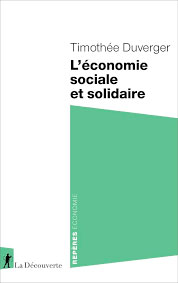The book ‘Social and Solidarity Economy’, by Timothée Duverger, PhD in History and professor at Sciences Po Bordeaux, published in 2023 in French is now available in English and in Spanish. Duverger leads the TerrESS chair, as well as the Master’s in “Social and Solidarity Economy and Social Innovation” (ESSIS) and the executive Master’s in “Strategies, Territories, and Innovative Projects in Social and Solidarity Economy” (STPI-ESS).
As the author —President of the CIRIEC-France Advisory Council and organizer of the CIRIECInternational Research Conference on Social Economy to be held in Bordeaux next October— explains, the historiography of Social Economy, initially activist-driven or developed by enterprises, generally studied by sociologists and later by some historians, has evolved through monographic, sectoral, or territorial studies.
There are syntheses on the subject for both the 19th century (Gueslin, 1987) and the 20th century (Duverger, 2016; Dreyfus, 2017). Although often analyzed from a social history perspective, its study has been renewed through an institutionalist approach, questioning the role it plays in the institutional adjustments of capitalism (Celle, 2020; Demoustier, 2015; Duverger et al., 2020), particularly in relation to the state (Chaïbi, 2018).
The Social Economy has enjoyed growing recognition worldwide in the academic community since the first decade of the 2000s. There is a wealth of literature on the subject. Interest comes from a number of disciplines, including sociology, economics, law, management sciences, history, geography and political science, with the inevitable attendant interdisciplinary research and dialogue between actors and researchers.
The concept of social and solidarity economy (SSE) dates back to the year 2000, when the historic social economy (cooperatives, mutual societies, and associations) moved closer to the solidarity economy, born two decades earlier from transformations of the welfare state associating integration activities with the new community services (childcare, homecare services, etc.).
The SSE is also a source of social innovation in higher education and research. This can be seen in the initiatives of associations, cooperatives, and mutual societies active in both student life and degree courses (Ros et al. 2021), as well as in the development of participatory research (Juan 2021).
With increasing recognition in the socioeconomic, political, institutional, and academic spheres, Social and Solidarity Economy is emerging, at a time of enterprise reform and ecological transition, as the “desirable norm for tomorrow’s economy”.
This book offers students, professionals, volunteers, elected officials, and the general public an interdisciplinary vision of the major research on SSE, as well as a presentation of the key issues at the heart of contemporary transformation.







